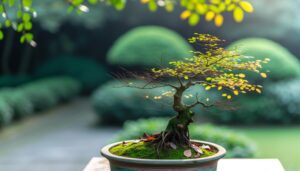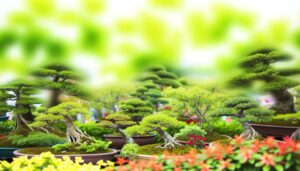5 Good Reasons Bonsai Cultivation Might Be Beneficial
Bonsai, the ancient practice originating in China and refined in Japan, symbolizes harmony between man, nature, and the divine. It offers profound mental health benefits, such as stress reduction, mindfulness, and a sense of accomplishment.
Bonsai cultivation requires meticulous care, including proper watering, pruning, and soil management, ensuring the longevity and health of these living artworks. However, misconceptions exist; bonsai trees are not naturally miniature but shaped through skilled techniques.
The practice fosters deep connections with nature and provides emotional enrichment. To understand the nuanced perspectives on bonsai’s impact, historical significance, and intricate care, one must explore further.
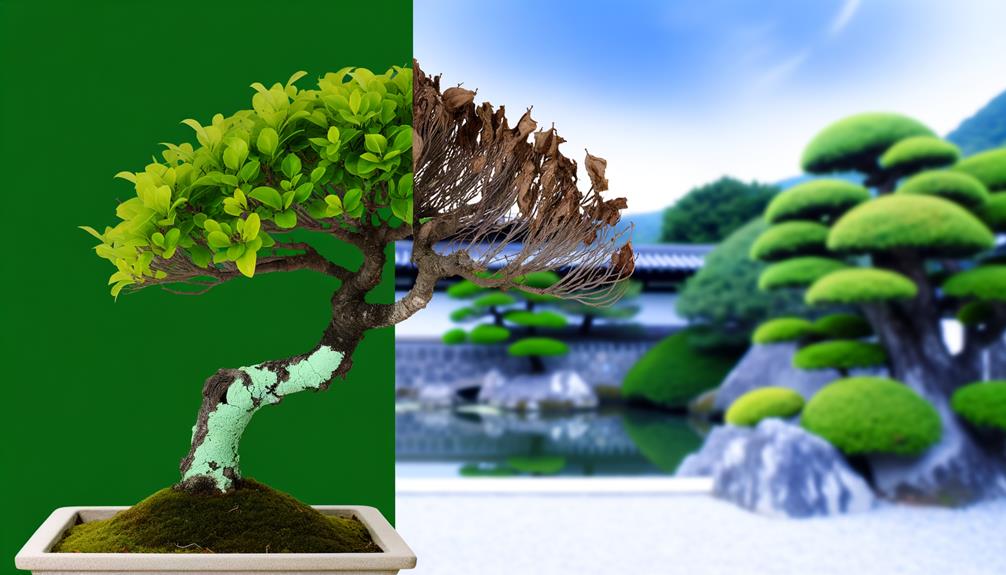
1 Key Takeaways
- Bonsai reduces stress and anxiety through its calming nature and promotes mental well-being.
- Properly maintained bonsai trees can live for centuries, enriching cultural heritage.
- Misconceptions about bonsai needing minimal care can lead to improper maintenance and plant harm.
- Bonsai cultivation requires commitment, patience, and intricate techniques for success.
- Bonsai fosters mindfulness, enhances focus, and offers a therapeutic creative outlet.
2 History of Bonsai
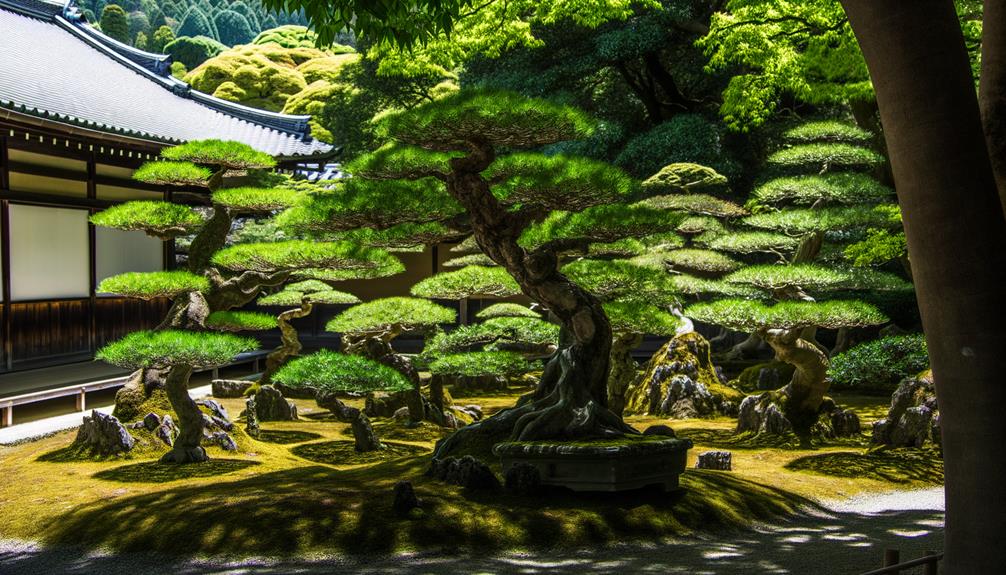
The history of bonsai, an ancient art form originating over a thousand years ago in China before being refined in Japan, reveals a profound cultural significance and meticulous horticultural techniques. Initially known as ‘penjing’ in China, these miniature landscapes symbolized the harmony between man, nature, and the divine.
Japanese practitioners later adopted and evolved the art, emphasizing simplicity, balance, and aesthetic beauty. Bonsai trees are meticulously cultivated through pruning, wiring, and potting to replicate mature, naturally occurring trees in miniature form. This process requires patience, skill, and a deep understanding of botany and artistry.
Over centuries, bonsai has transcended its horticultural roots to become a cherished cultural practice, embodying principles of Zen Buddhism and reflecting the impermanent nature of life.
3 Benefits for Mental Health
The cultivation of bonsai offers significant mental health benefits, including the reduction of stress through the calming effects of nature and hands-on care.
Engaging in the meticulous practice of shaping and maintaining these miniature trees promotes mindfulness and enhances focus, providing a meditative escape from daily life’s chaos.
Additionally, bonsai serves as a therapeutic creative outlet, allowing individuals to express themselves artistically while fostering a sense of accomplishment and well-being.
Stress Reduction Benefits
Cultivating bonsai trees has been shown to markedly alleviate stress and enhance mental well-being through its meditative and mindful practices. Engaging in the delicate art of bonsai fosters a sense of tranquility, encouraging individuals to immerse themselves in the present moment. This practice not only diverts attention from daily stressors but also promotes a peaceful state of mind. Studies indicate that interacting with nature, even on a miniature scale, can notably lower cortisol levels, the hormone responsible for stress. Below is a concise table summarizing the primary stress reduction benefits of bonsai cultivation:
| Benefit | Description | Outcome |
|---|---|---|
| Mindful Engagement | Focus on precise tasks | Reduces anxiety |
| Nature Interaction | Connection with natural elements | Lowers stress hormone levels |
| Creative Expression | Artistic and creative outlet | Enhances mood |
| Sense of Accomplishment | Achievement from nurturing growth | Boosts self-esteem |
Mindfulness and Focus
By immersing oneself in the meticulous care and artistic shaping of bonsai trees, individuals can greatly enhance their mindfulness and focus, leading to profound mental health benefits.
The deliberate and attentive nature of bonsai cultivation demands a high level of concentration, fostering a meditative state that aligns closely with mindfulness practices. This focused engagement helps to quiet the mind, promoting mental clarity and a sense of tranquility.
The repetitive and delicate tasks involved, such as pruning, wiring, and watering, require sustained attention, thereby honing one’s ability to concentrate. Over time, this practice can significantly reduce cognitive overload and improve overall mental well-being.
Thus, bonsai cultivation serves as an effective conduit for enhancing mental acuity and emotional balance.
Therapeutic Creative Expression
As individuals immerse themselves in the mindful practice of bonsai cultivation, they also open a powerful avenue for therapeutic creative expression, which brings additional mental health benefits. This intricate art form allows practitioners to channel their emotions and thoughts into a living canvas, fostering a sense of accomplishment and inner peace.
The meticulous care and design involved in shaping a bonsai tree can alleviate stress and provide a sense of purpose.
- Emotional Outlet: Offering a constructive way to manage and release emotions.
- Enhanced Focus: Encouraging concentration, which can help reduce anxiety.
- Personal Fulfillment: Cultivating a sense of achievement through visible progress and growth.
Thus, bonsai serves not just as a hobby but as a holistic mental wellness practice.
4 Artistic Expression
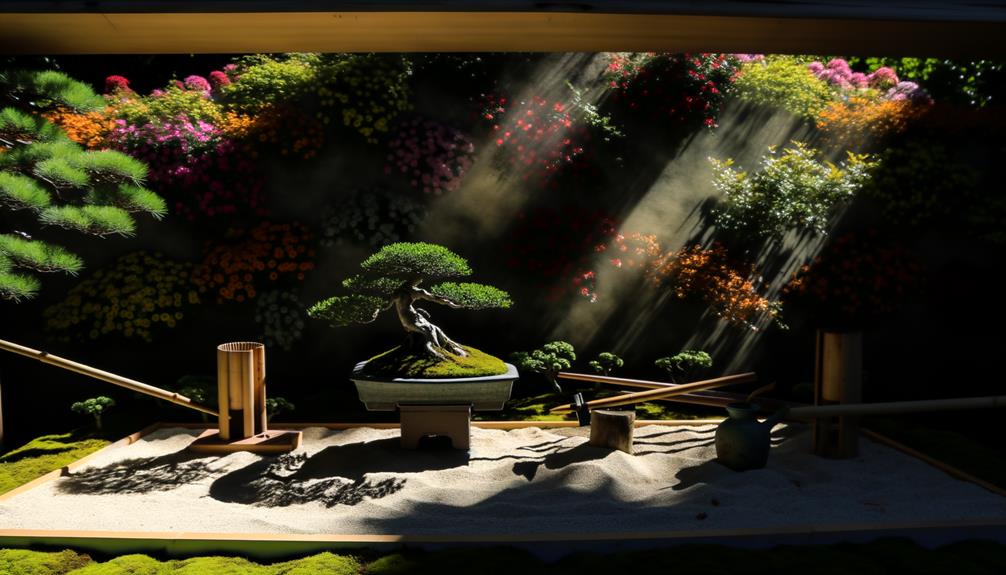
The practice of bonsai, deeply anchored in ancient traditions, serves as a profound medium for artistic expression, allowing practitioners to convey complex emotions and philosophical concepts through meticulously cultivated miniature trees.
By manipulating growth patterns, selecting containers, and shaping branches, bonsai artists create living sculptures that reflect themes of balance, harmony, and the passage of time.
Each tree, unique in form and essence, tells a story that transcends mere aesthetics, embodying the artist’s vision and mindfulness.
The interplay of natural and artistic elements in bonsai fosters a dialogue between humanity and nature, inviting observers to appreciate the intrinsic beauty and delicate intricacies of these miniature masterpieces.
Bonsai stands as a tribute to the limitless potential of human creativity.
5 Environmental Impact
Cultivating bonsai trees can have diverse environmental impacts, ranging from the conservation of plant species to the potential strain on natural resources. On the positive side, bonsai cultivation can foster a deep appreciation for nature and encourage the preservation of endangered plant species. Enthusiasts often engage in sustainable practices, promoting biodiversity by nurturing rare and unique tree varieties.
However, the practice can also lead to environmental concerns. The need for specific soil types, fertilizers, and adequate water can place a burden on natural resources.
- Conservation: Bonsai can aid in preserving rare plant species.
- Resource Use: Specialized soil and water needs can strain resources.
- Biodiversity: Nurturing diverse species supports ecological balance.
Balancing these factors is essential for sustainable bonsai cultivation.
6 Ethical Considerations
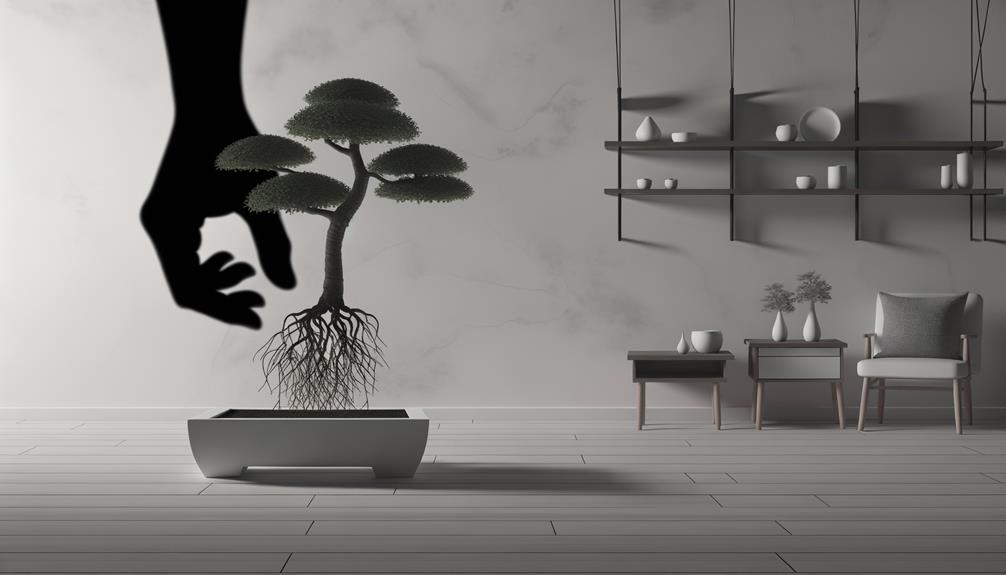
When discussing the ethical considerations of bonsai cultivation, two primary points emerge:
- Tree welfare practices scrutinize the methods used to shape and maintain these miniature trees, questioning whether they cause undue stress or harm.
- The cultural significance debate examines the respect and reverence afforded to bonsai in its originating cultures versus its commodification and potential misrepresentation in others.
Tree Welfare Practices
Ethical considerations surrounding bonsai cultivation primarily revolve around ensuring the well-being and health of the trees while balancing aesthetic goals. Responsible bonsai practitioners prioritize tree welfare through meticulous care and maintenance practices.
Ensuring ethical treatment includes:
- Proper Watering and Nutrient Management: Adequate hydration and soil nutrients are essential for a bonsai’s health.
- Pest and Disease Control: Regular inspections and organic treatments help prevent harm without causing environmental damage.
- Gentle Pruning and Wiring Techniques: These methods should encourage natural growth patterns, minimizing stress on the tree.
Passionate bonsai artists understand that the beauty of a bonsai is intrinsically linked to its health. By adhering to these ethical practices, they foster not only the aesthetic appeal but also the longevity and well-being of their miniature trees.
Cultural Significance Debate
How does the cultural significance of bonsai influence the ethical considerations surrounding its practice?
Bonsai, deeply rooted in Japanese tradition, symbolizes harmony, patience, and the beauty of nature captured in miniature form. This cultural reverence elevates bonsai beyond mere horticulture, intertwining it with philosophical and spiritual dimensions.
However, this profound significance prompts ethical scrutiny. Critics argue that the manipulation and confinement of trees for aesthetic purposes may conflict with principles of natural growth and freedom.
The ethical debate intensifies with commercial exploitation, where mass-produced bonsai may lack the cultural and spiritual care traditionally bestowed.
Thus, while bonsai’s cultural heritage enriches its practice, it also requires a conscientious approach to ensure respect for both the art form and the living trees it involves.
7 Care and Maintenance
Proper care and maintenance of bonsai trees are necessary for ensuring their health, longevity, and aesthetic appeal. To nurture these miniature masterpieces, one must pay close attention to several important factors.
Regular watering, suitable to the species and environmental conditions, is paramount to prevent both desiccation and overwatering.
Pruning is equally essential, promoting balanced growth and maintaining the desired shape.
Additionally, repotting every two to three years rejuvenates the tree by revitalizing its soil and trimming its roots.
These practices are the foundation of bonsai care, ensuring the trees thrive and captivate admirers.
8 Tree Longevity
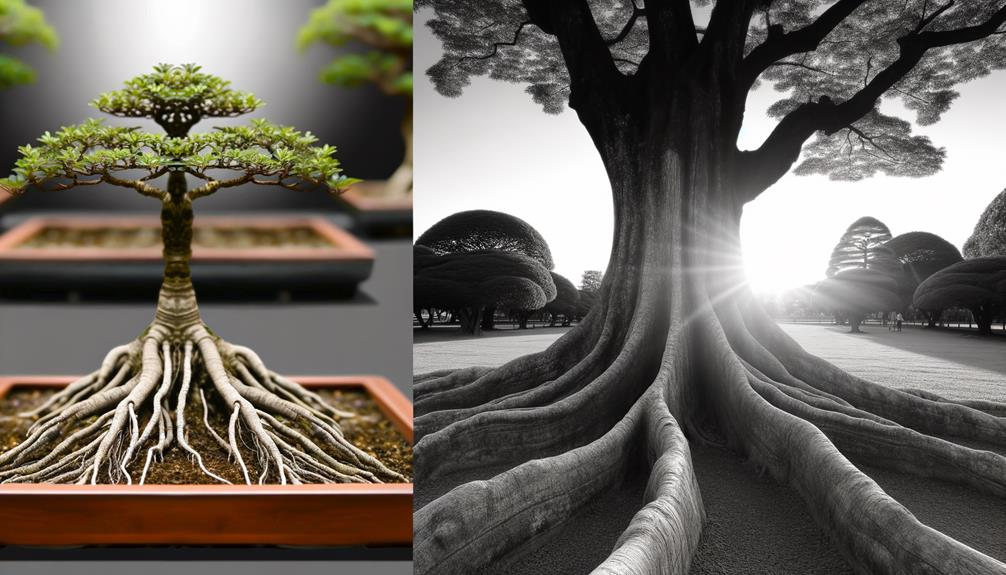
Ensuring the longevity of bonsai trees is intricately linked to their meticulous care and maintenance, reflecting the dedication and skill of the cultivator. Proper watering, pruning, and soil management are paramount in extending the life span of these miniature wonders.
A well-maintained bonsai can live for decades, sometimes even centuries, mirroring the longevity of their full-sized counterparts. The cultivator must be attuned to the tree’s needs, understanding the balance of light, humidity, and nutrients. Seasonal adjustments are essential, as each phase of the year brings unique requirements.
This harmonious relationship between tree and caretaker not only enhances the bonsai’s lifespan but also enriches the cultivator’s journey, making bonsai cultivation both a rewarding and enduring pursuit.
9 Common Misconceptions
Many misconceptions surround bonsai cultivation, often stemming from a lack of understanding about the intricate techniques and commitment required to nurture these miniature trees. One prevalent myth is that bonsai trees are genetically dwarfed plants. In reality, bonsai are regular trees trained to remain small through careful pruning and potting.
Another misconception is that bonsai can thrive with minimal care. This is far from true; they require careful attention to detail.
10 Expert Opinions
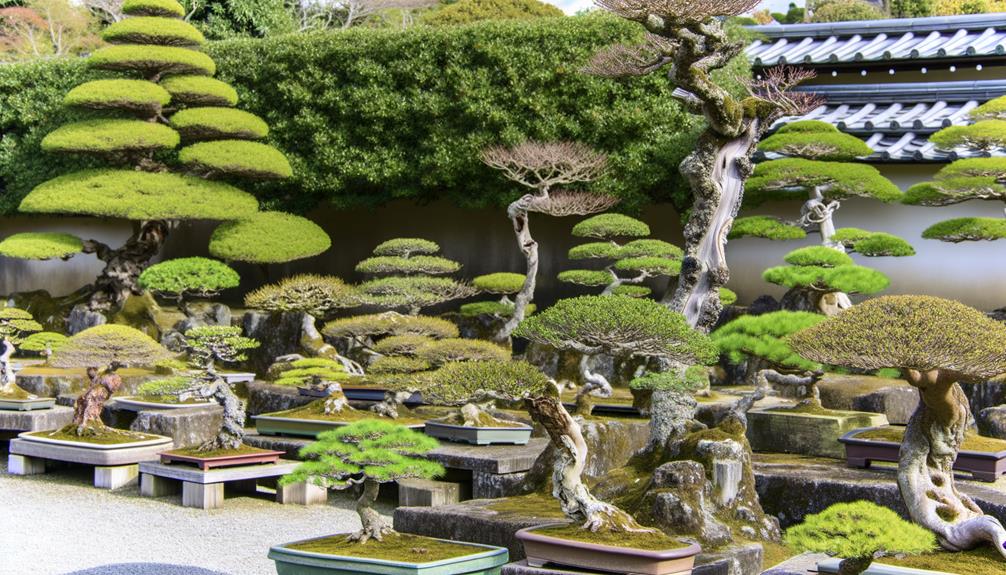
Leading experts in the field of bonsai cultivation emphasize that understanding the intricate balance of horticultural practices and artistic expression is essential to mastering this ancient art form. Renowned bonsai artist John Naka highlighted the importance of patience, stating that ‘Bonsai is not the result: that comes after. Your enjoyment is what is important.’ Dr. Amy Liang, a respected scholar, argues that bonsai fosters a deep connection with nature, enhancing mental well-being. Conversely, some horticulturists warn against improper techniques that may harm the plants.
| Expert | Key Insight | Perspective |
|---|---|---|
| John Naka | Patience is essential | Artistic |
| Dr. Amy Liang | Deepens connection with nature | Psychological |
| Critic A | Risk of plant harm with poor practices | Horticultural |
| Expert B | Balance of art and science | Holistic |
| Enthusiast C | Enhances personal fulfillment | Emotional |
11 Conclusion
In summation, the practice of bonsai, with its rich history and multifaceted benefits, stands as a proof to humanity’s ability to simultaneously nurture and dominate nature.
While some may argue over its environmental and ethical ramifications, the undeniable mental health benefits and artistic expression it affords practitioners make it a uniquely complex hobby.
In a world where the survival of a houseplant can be a Herculean task, bonsai offers both an escape and a challenge, all wrapped in miniature foliage.

